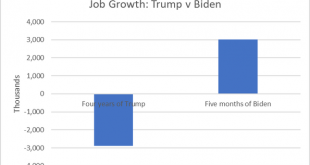from Dean Baker Yes, it is that time of month again. As I always say, this sort of comparison is silly, since there are so many factors determining job growth that have nothing to do with the person in the White House. But, we all know that Trump and the Republicans would be touting this to the sky if the shoe were on the other foot. So, here’s the latest, the economy has created more than 3 million jobs in the first five months of the Biden administration. It lost almost 2.9 million...
Read More »The G7’s tax reform could entrench global inequality
from Jayati Ghosh The tax proposal decided at the G7 Finance Ministers’ meeting last weekend has been hailed as ‘historic’ and ‘transformative’. But in its present form, it is, unfortunately, neither. Major changes can and should be made — at least by the G20 where this will next be considered — if there is to be any serious global tax reform. The proposal is based on the recognition that the international tax architecture, designed for an earlier and very different era, contains...
Read More »Economics — a severe case of misplaced idolatry of ‘rigour’
from Lars Syll There is something about the way macroeconomists construct their models nowadays that obviously doesn’t sit right. Empirical evidence — still — only plays a minor role in mainstream economics, where models largely function as a substitute for empirical evidence. One might have hoped that humbled by the manifest failure of its theoretical pretences during the latest economic-financial crises, the one-sided, almost religious, insistence on axiomatic-deductivist modeling as...
Read More »Trains and population density: U.S. and Europe
from Dean Baker There are lots of silly comments that pass for great wisdom in elite circles. Steve Rattner gave us one of my favorites in his NYT column warning President Biden against putting too much money into reviving our system of train travel. Rattner tells us: “America is not Europe, with its dense population centers clustered reasonably close together.” This is of course true, but in a totally trivial sense. The density of our population per mile of land is much lower than in...
Read More »Weekend read – Essentialism and traditionalism in academic research
from Ryan Kyger1and Blair Fix Philosophy of science is about as useful to scientists as ornithology is to birds. — attributed to Richard Feynman2 Most scientists don’t worry much about philosophy; they just get on with doing ‘science’. They run experiments, analyze data, and report results. And by so doing, they fall repeatedly into known philosophical pitfalls. This essay is about two such pitfalls: essentialism and traditionalism. ‘Essentialism’ is the view that behind real-world...
Read More »Open thread June 2, 2021
Techno babble
from Peter Radford What is about technology? It’s either a panacea for all our ills, or it’s the cause of all the aforesaid ills. Why can’t we make up our minds? This morning’s Financial Times is, sort of, a good demonstration of the confusion we are in. On the one hand there’s any article about cryptocurrencies. On the other there’s a rather less techno-centric article about bank culture. In both cases technology looms large. In neither is technology really mentioned in detail. It...
Read More »RIP Steve Horwitz
RIP Steve Horwitz Steven G. Horwitz died the day before yesterday of lymphoma at age 57. Probably most reading this do not know who he was, but he was somebody I knew quite well, even as I disagreed with him quite a lot about economics. He was arguably the leading monetary economist out of the group of neo-Austrian economists who came out of George Mason University and who have been closely linked to Peter Boettke who is there, arguably the...
Read More »The economics of New Developmentalism: a critical assessment
This paper critically assesses the economics of New Developmentalism (ND). It begins by identifying and formalizing the principal components of ND which are identified as neutralizing Dutch disease, ending growth with foreign saving, development driven by a technologically advanced and internationally competitive manufacturing private sector, and getting macroeconomic prices right. It then examines four strands […]
Read More »Taking the con out of RCTs
from Lars Syll Development actions and interventions (policies/programs/projects/practices) should be based on the evidence. This truism now comes with a radical proposal about the meaning of “the evidence.” In development practice, where there are hundreds of complex, sometimes rapidly changing, contexts seemingly innocuous phrases like “rely on the rigorous evidence” are taken to mean: “Ignore evidence from your context and rely in your context on evidence that was ‘rigorous’ for...
Read More » Heterodox
Heterodox




